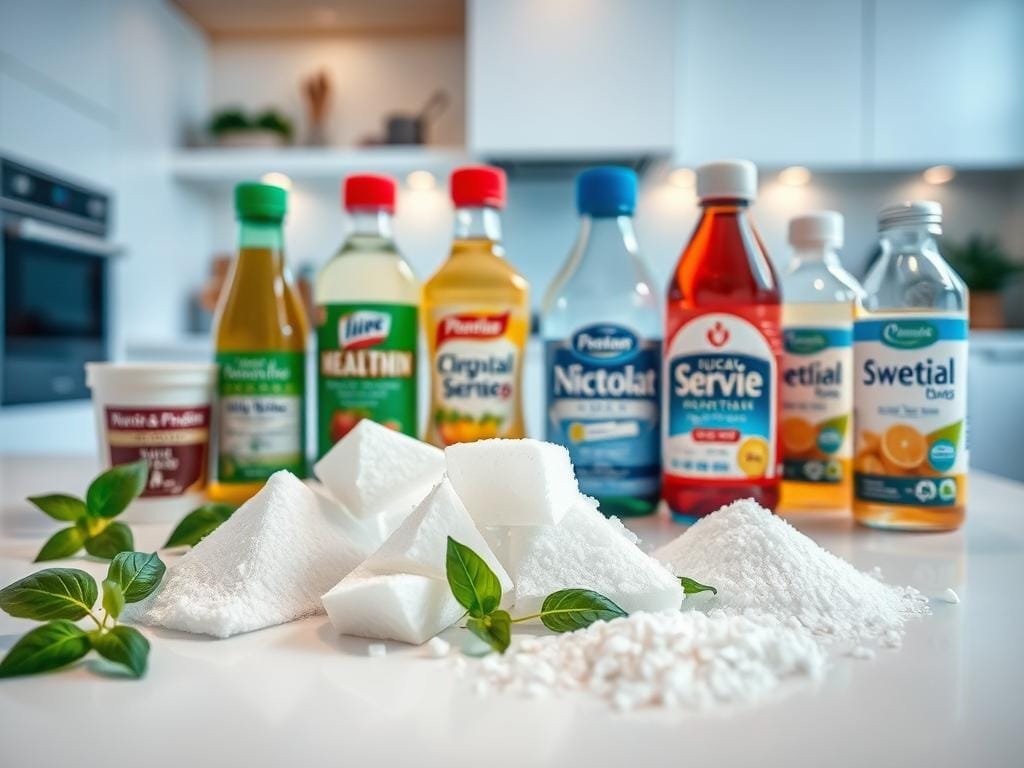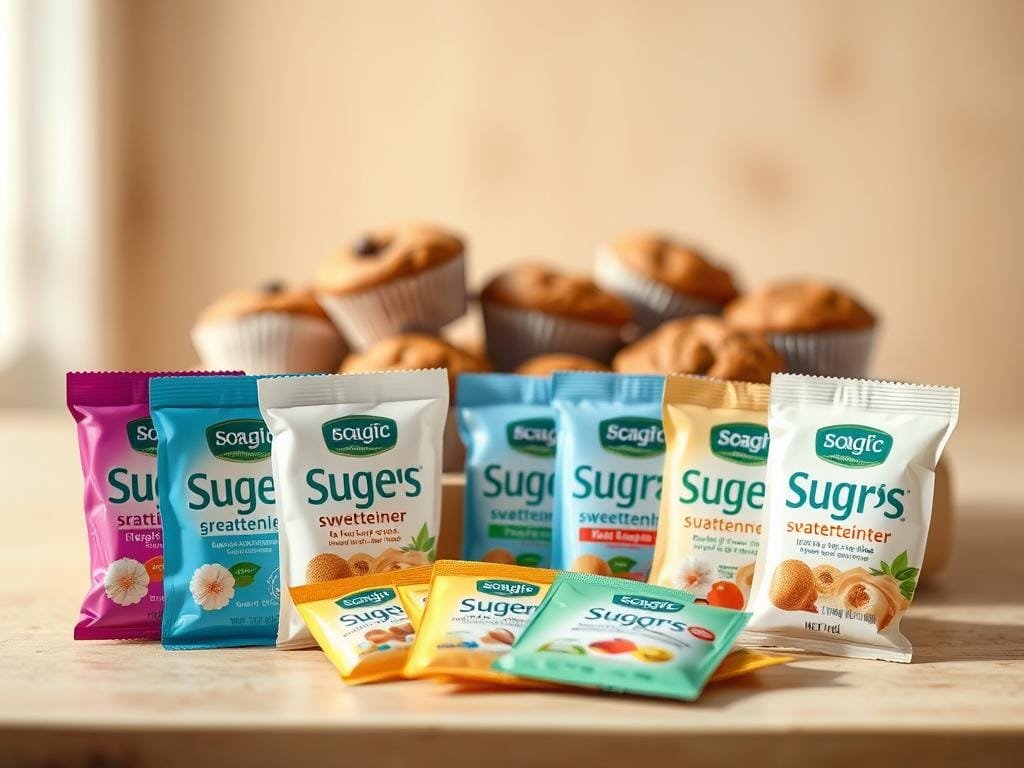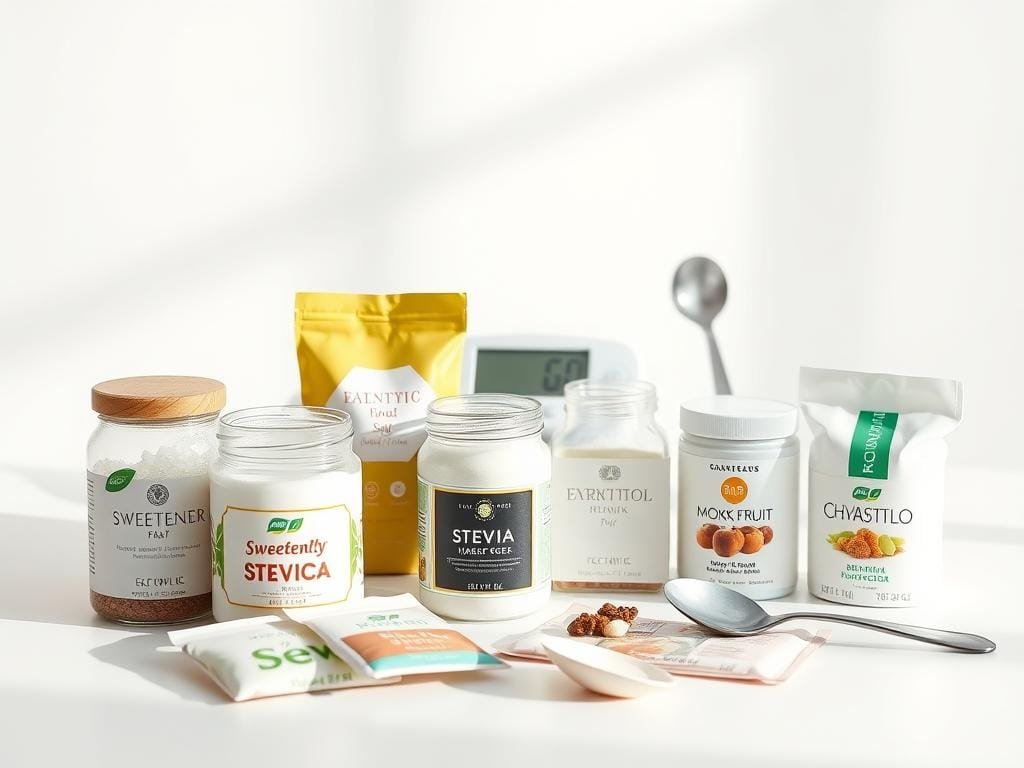Have you ever wondered about sugar substitutes and their impact on your health? Many people use them to cut down on sugar. But are they really better for you?
The Mayo Clinic Staff says sugar substitutes help people reduce sugar. But with so many options, it’s tough to know what’s best.
Exploring sugar substitutes is key to making smart choices. This article will cover the different types, their good points, and possible downsides. This way, you can decide what’s best for your health.
Table of Contents
Key Takeaways
- Understand the different types of sugar substitutes available.
- Learn about the benefits and possible drawbacks of natural and artificial sweeteners.
- Discover how to make informed decisions about your sugar substitute choices.
- Explore the impact of sugar substitutes on your overall health.
- Get the facts on how to use sugar substitutes effectively.
Understanding Sugar: Types and Functions
Knowing about the different types of sugar is key to managing your diet. Sugar is a carbohydrate that helps your body get energy. But, not all sugars are the same, and they affect your health differently.
Natural Sugars vs. Added Sugars
Sugar comes in two main types: natural and added. Natural sugars are in foods like fruits, veggies, and dairy. For instance, fruits have fructose, and milk has lactose. On the other hand, added sugars are added during food processing. Examples include sucrose, high fructose corn syrup, and glucose.
Natural sugars are better because they come with nutrients, fiber, and make you feel full. Added sugars, though, add a lot of calories but little nutrition.
Common Sources of Sugar in Your Diet
Sugar is everywhere in your diet. Added sugars are not just in sweets and drinks. They’re also in many processed foods, like:
- Savory snacks like flavored chips and crackers
- Breakfast cereals and energy bars
- Canned fruits and vegetables
- Condiments and sauces
To control sugar intake, learn to read food labels. Look for sugar names in the ingredients to spot and cut down on added sugars.
“The more you know about what you’re putting in your body, the better equipped you’ll be to make healthier choices.”
By learning about sugar types and their sources, you can make better choices about sugar in your diet.
The Rise of Sugar Substitutes in the Market
The market is seeing a big change towards healthier eating. People are now looking for sweet treats without the guilt. This is because they know too much sugar is bad for them.

Overview of Popular Sugar Substitutes
The variety of sugar substitutes is vast. You can find everything from artificial sweeteners to natural ones. Artificial sweeteners like aspartame and sucralose have been around for years. They offer sweetness without the calories.
Natural sweeteners like stevia and honey are becoming more popular. They are seen as a better choice than sugar and artificial sweeteners.
Reasons for Choosing Sugar Alternatives
So, why do people choose sugar substitutes? They want to control their sugar cravings without gaining weight. They also want to avoid health problems linked to sugar. Plus, they fit into diets like keto or low-carb.
- More people are focusing on health, leading to a demand for healthy products.
- Health issues linked to sugar are making people look for alternatives.
- Sugar substitutes come in many forms, making them easy to use in daily life.
The trend of sugar substitutes is here to stay. They give people many ways to manage their sugar intake.
Health Impacts of Sugar Consumption
Sugar affects your health in many ways, from metabolism to weight management. Eating too much sugar can lead to serious health problems. It’s important to know how it impacts you.
Effects on Metabolism and Weight
Too much sugar can upset your metabolic processes, leading to weight gain. When you eat more sugar than you need, your body turns it into fat. This fat can build up in different parts of your body.
A diet full of sugar can also mess with your metabolism. It can cause insulin resistance, where your cells don’t respond well to insulin. This can increase your risk of type 2 diabetes and other metabolic problems.
Relationships Between Sugar and Health Conditions
Research shows that eating too much sugar is linked to many health issues. For example, a diet with lots of added sugars raises your risk of heart disease and some cancers.
| Health Condition | Association with Sugar Consumption |
|---|---|
| Obesity | High sugar intake contributes to weight gain and obesity. |
| Type 2 Diabetes | Excessive sugar consumption can lead to insulin resistance and type 2 diabetes. |
| Heart Disease | A diet high in added sugars increases the risk of heart disease. |
Knowing these connections can help you make better choices about sugar. This might lower your risk of getting these diseases.
Artificial Sweeteners: What You Should Know
Do you use artificial sweeteners every day? You might not know about the different types and their health effects. These sweeteners are made to taste like sugar but have no calories. They’re found in diet foods, drinks, and sugar-free items.
Types of Artificial Sweeteners
The FDA has okayed several artificial sweeteners for use. These include aspartame, sucralose, and saccharin. Each sweetener is used in different products.
- Aspartame is in diet sodas and low-calorie desserts.
- Sucralose, or Splenda, tastes like sugar and is great for baking.
- Saccharin, known as Sweet’N Low, is very sweet and old.

Safety Concerns and Health Studies
Even though the FDA says they’re safe, some worry about artificial sweeteners. Some studies link them to cancer, brain problems, and metabolic issues.
But, many health groups like the FDA and the American Cancer Society have done a lot of research. They found no strong proof of these dangers. It’s important to remember that artificial sweeteners can help with calorie control, but use them in moderation.
Key Considerations:
- Always check the labels to know what artificial sweeteners you’re eating.
- Think about your health needs and talk to a doctor if you’re worried.
Natural Sweeteners: Are They Safer?
Many people are now looking for safer alternatives to sugar. They wonder if natural sweeteners are better for them. Let’s dive into the world of natural sweeteners and their benefits.
Popular Natural Sweeteners to Consider
Several natural sweeteners are popular for their unique tastes and health benefits. Some of the most used natural sweeteners include:
- Honey
- Maple syrup
- Coconut sugar
- Stevia
These sweeteners add sweetness to foods and drinks. They are also valued for their nutritional value. For example, honey contains antioxidants and has been used for centuries for its health benefits.
Nutritional Benefits of Natural Alternatives
Natural sweeteners have nutritional benefits unlike artificial ones. For example, maple syrup contains minerals like manganese and zinc. Here’s a comparison of some popular natural sweeteners’ nutritional benefits:
| Natural Sweetener | Nutritional Benefits |
|---|---|
| Honey | Rich in antioxidants, has antibacterial properties |
| Maple Syrup | Contains manganese and zinc |
| Coconut Sugar | Lower glycemic index, contains iron and zinc |
While natural sweeteners have many benefits, it’s important to use them in moderation. Even though they are safer than refined sugar, too much can cause health problems.
In conclusion, natural sweeteners like honey and maple syrup add sweetness and provide nutritional benefits. When looking for sugar alternatives, choose options that fit your dietary needs and preferences.
How Sugar Substitutes Affect Taste and Cooking
Sugar substitutes vary in taste, affecting cooking and baking. It’s key to pick the right one for your recipe’s taste and texture.

Flavor Profiles of Different Sweeteners
Each sugar substitute has its own taste. Stevia and monk fruit sweetener are sweet but might taste like licorice. Sugar alcohols like xylitol and erythritol taste like sugar but can upset some stomachs.
Choosing the right sugar substitute can change your dish’s taste. For example, stevia in baked goods tastes different from sugar. Knowing these differences helps you swap sugar successfully.
Cooking and Baking with Sugar Alternatives
Using sugar substitutes in cooking and baking needs adjustments. They don’t provide the same texture or browning as sugar. Sugar makes baked goods crispy, a quality substitutes lack. You might need to add other ingredients or change cooking methods to get the right texture.
In baking, the type of sugar substitute matters. Some, like erythritol, can dry out baked goods. Adding extra moisture or mixing substitutes can help achieve the right texture and flavor.
Trying different sugar substitutes in recipes helps you understand their impact. This way, you can make better choices and adjust your cooking and baking techniques.
The Role of Sugar in Your Diet
Sugar is a key energy source for our bodies. But too much of it can cause health problems.
Balancing Sugar Intake for Optimal Health
It’s important to balance your sugar intake for good health. Pay attention to how much sugar you eat each day. Choose your foods wisely.
Tips for Balancing Sugar Intake:
- Read food labels to identify added sugars.
- Choose products with less added sugar.
- Opt for whole foods over processed ones.
Understanding Recommended Daily Limits
The American Heart Association suggests a daily sugar limit. Women should not have more than 25 grams, and men should not have more than 36 grams. Following these limits can prevent health issues from too much sugar.
| Demographic | Recommended Daily Sugar Intake |
|---|---|
| Women | 25 grams |
| Men | 36 grams |
Knowing and following these sugar intake guidelines helps you make better choices. This leads to a healthier life.
Consumer Perceptions of Sugar Substitutes
People have mixed feelings about sugar substitutes. They worry about health and get confused by false info. As more people want low-sugar foods, it’s key to understand what they think.
Popular Beliefs and Misconceptions
Many think sugar substitutes are better for you because they have fewer calories. But, some worry about their safety and how well they work. Others get mixed up by the many types out there.
Some believe all sugar substitutes are bad and artificial. But, there are natural ones too. For example, stevia and monk fruit are seen as safer because they come from nature.

Trends in Sugar Substitute Usage
More people are choosing sugar substitutes, thanks to health concerns. They prefer natural ones over artificial ones. This shows a bigger trend towards natural and organic choices.
Some key trends in sugar substitute usage include:
- Increased demand for natural sweeteners like stevia and monk fruit.
- Growing awareness and scrutiny of artificial sweeteners.
- Rise in product labeling that highlights the use of “natural” or “low-calorie” sweeteners.
As people learn more about sugar substitutes, their choices will likely change. This will shape what kinds of products are made.
Regulatory Standards for Sugar Substitutes
Understanding sugar substitutes means knowing the rules that guide them. As more people care about their health, the need for these substitutes has grown. This has led to clear guidelines from regulatory bodies.
Regulating sugar substitutes involves many groups. These include makers, users, and agencies like the FDA. Knowing these rules is key for following the law and keeping people safe.
Overview of FDA Guidelines
The FDA is key in the U.S. for sugar substitute rules. They check if these substances are safe before they can be in food. They look at scientific data to see how they might affect health.
FDA Approval Process:
- Submission of a food additive petition
- Review of safety data and scientific evidence
- Publication of a regulation in the Federal Register
The FDA also keeps a list of safe sugar substitutes. This list is called the Generally Recognized as Safe (GRAS) list. Things on this list are seen as safe for eating based on science.
Labeling Requirements for Sweeteners
Labeling rules for sugar substitutes are also important. Makers must show that these substances are in the product. They also need to list nutritional info.
Key Labeling Considerations:
- Clear identification of the sugar substitute used
- Indication of the amount of sugar substitute per serving
- Compliance with FDA guidelines for health claims
The Mayo Clinic Staff says, “Artificial sweeteners and other sugar substitutes are used instead of sugar. They help with weight, blood sugar, and teeth.” Following labeling rules helps give people the info they need to choose wisely.
The labeling of food products, including those containing sugar substitutes, is subject to FDA regulations to ensure that consumers have access to accurate and meaningful information.
By following these rules, makers can make sure their products are safe and meet FDA standards.
Sugar Substitutes and Weight Management
Obesity is becoming more common, and sugar substitutes are seen as a way to help manage weight. It’s important to know how they affect your weight loss efforts.
Can They Help with Weight Loss?
Sugar substitutes offer sweetness without calories. Studies show they can aid in weight loss when used right. A study in the Journal of the Academy of Nutrition and Dietetics found they help with weight loss, mainly when part of a low-calorie diet.
Key benefits of sugar substitutes for weight loss include:
- Reduced calorie intake
- Lower glycemic index
- Assistance in managing cravings for sweet tastes
But, how well they work can depend on many factors, like your diet and health.
Potential Risks of Overconsumption
While helpful, sugar substitutes can be overused. Some studies worry they might mess with how our bodies handle calories, leading to eating too much or making bad food choices.
A comparison of popular sugar substitutes and their possible risks is shown in the table below:
| Sugar Substitute | Potential Risk | Recommended Consumption |
|---|---|---|
| Aspartame | Possible link to headaches and digestive issues in sensitive individuals | Moderate consumption advised |
| Saccharin | Potential impact on gut bacteria | Consume in limited amounts |
| Stevia | Generally considered safe, but high doses may cause gastrointestinal issues | Can be consumed in moderation |
When using sugar substitutes, watch how much you eat. Pick products that fit your health goals.

In summary, sugar substitutes can help with weight management if used wisely. Knowing their benefits and risks helps you make smart choices for your weight loss journey.
Future of Sugar Substitutes in the Food Industry
The future of sugar substitutes looks promising. Innovations in sweetener development are changing the food industry. This is because people are looking for healthier options, driving growth and innovation.
Several factors are driving this trend. People are becoming more health-conscious. They are learning about the dangers of too much sugar. This is making food manufacturers switch to sugar substitutes.
You can expect to see more products with less sugar. This change is a big deal for the food industry.
Innovations in Sweetener Development
New sugar substitutes are being developed fast. Scientists are searching for alternatives that taste good and work well in food. Some innovative approaches include:
- Creating sweeteners from plants and fruits.
- Improving the taste of existing sugar substitutes.
- Making blends of different sweeteners for better taste and function.
For example, the move to sugar alternatives is helping health-conscious consumers. This trend will keep growing, with new products coming out.
Predictions for Consumer Preferences
As consumers get more picky, their tastes will change. Expect a rise in demand for:
- Natural and organic sugar substitutes.
- Products with clear labels and few ingredients.
- Sugar substitutes with extra health benefits, like prebiotics.
The food industry is ready to meet these needs with more innovation. As you explore these changes, it’s key to keep up with the latest news and trends.
Making Informed Choices About Sugar and Alternatives
Understanding sugar and sugar substitutes is key for your health. Knowing the types of sugars and their sources helps a lot. It also helps you choose better alternatives.
Label Literacy
Reading food labels is important for controlling sugar intake. Look for hidden sugars in packaged foods. Also, learn the different names for sugar on labels.
Get to know the various sugar substitutes, both artificial and natural. This helps you make choices that fit your health goals.
Dietary Adjustments
Lowering sugar in your diet is easy. Start by drinking less sugary drinks and eating fewer sweets. Choose whole foods over processed ones.
When you cook or bake, try natural sweeteners like stevia or monk fruit. They’re better than refined sugars.
